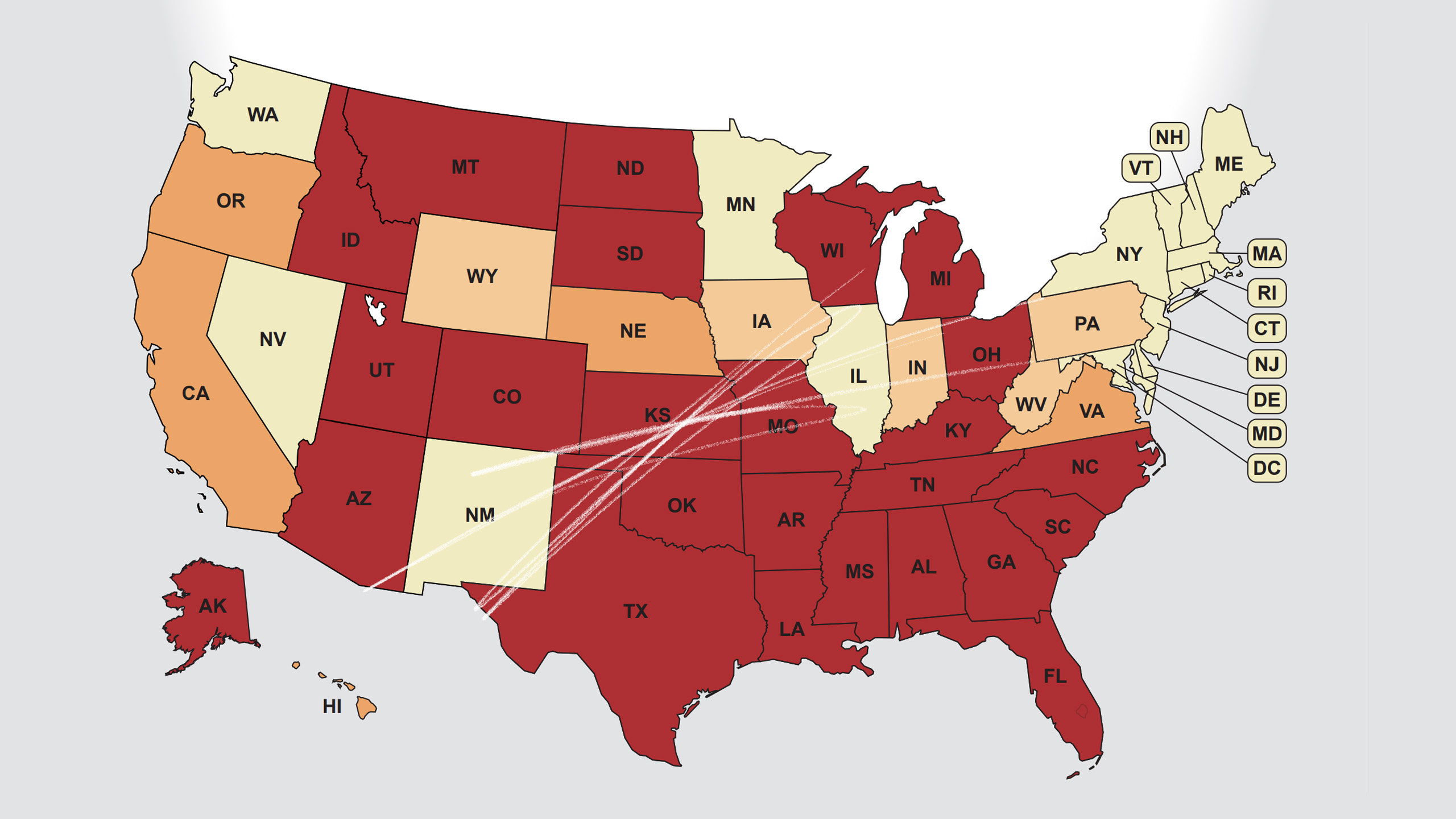Same-sex couples would no longer be able to marry in 25 U.S. states if the Supreme Court were to overturn marriage equality in the wake of repealing Roe v. Wade, according to a new report.
According to a March report from the progressive nonprofit Movement Advancement Project (MAP), 25 states have both a constitutional amendment and a statute banning same-sex marriage. Were the Supreme Court’s landmark 2015 ruling in Obergefell v. Hodges to be struck down, same-sex couples in these states would not be able to wed until their elected leaders either add a constitutional amendment affirming marriage equality, or repeal the existing constitutional ban and pass a new statute legalizing same-sex marriage.
These states are Alabama, Alaska, Arizona, Arkansas, Colorado, Florida, Georgia, Idaho, Kansas, Kentucky, Louisiana, Michigan, Mississippi, Missouri, Montana, North Carolina, North Dakota, Ohio, Oklahoma, South Carolina, South Dakota, Tennessee, Texas, Utah and Wisconsin.
Roe’s demise seems to be on the horizon. Last week a leaked draft opinion authored by Justice Samuel Alito referred to the landmark 1973 decision as “egregiously wrong from the start.” In the 98-page document released by Politico, the conservative justice went on to criticize watershed LGBTQ2S+ rights rulings like Obergefell and Lawrence v. Texas, a 2003 decision that decriminalized gay sex, as not “deeply rooted in the nation’s history and traditions.”
The likely repeal of Roe has, thus, sparked concerns from LGBTQ2S+ Americans that their rights are next on the chopping block.
“I think this decision is a clear continuation of Supreme Court justices letting opponents of LGBTQ equality know that they have friends on the court.”
“We’ve received a lot of questions about the state of marriage law across the country, recognizing that so goes Roe, so goes a lot of other foundational constitutional rulings,” Naomi Goldberg, the writer of the report and the deputy director and LGBTQ program director for MAP, tells Xtra.
Whether the Supreme Court can actually repeal Obergefell is still up for debate. Douglas Hallward-Driemeier, one of the lawyers on the case, told Business Insider that the sheer number of married same-sex couples would “make it very difficult” to roll back the decision. In contrast, Jim Obergefell, the plaintiff for whom the case was named, believes that not having the protections of Roe on the books would make marriage equality incredibly vulnerable to a legal challenge.
“I think this decision is a clear continuation of Supreme Court justices letting opponents of LGBTQ equality know that they have friends on the court,” he told Vice.
The repeal of Obergefell could have widespread impacts across the U.S., even in addition to the 25 states with both constitutional or statutory bans still in place. There are also other 10 states with either constitutional or statutory bans on the books, and most would become enforceable again if Obergefell were to be overturned. These states are California, Hawaii, Indiana, Iowa, Nevada, Oregon, Pennsylvania, Virginia, West Virginia and Wyoming.
Of these states, only California, Hawaii and Iowa have laws that would make it unlikely or impossible to enforce their bans on same-sex marriage.
In California, a 2014 court ruling struck down its infamous law banning same-sex marriage, and the state subsequently passed a statute allowing queer couples to marry. Similarly, legislation passed in Hawaii allows the state to limit marriages to one man and one woman, but it also has a statute explicitly legalizing same-sex marriage. Iowa also wouldn’t be able to enforce its marriage equality ban should Obergefell be overturned, as its Supreme Court struck down the statute in 2009.
Although there is some question as to whether the other states would enforce their bans were Obergefell to be wiped from the books, Goldberg believes that it’s probable that they would be. “When I look at the map, I think there’s a likelihood that they would be enforced,” she said. “I’ve heard from folks in Texas who would really like to not abide by Obergefell.”
Critically, MAP does note that same-sex couples who are already married would not lose that status were Obergefell dissolved. Moreover, Roe’s repeal would not automatically nullify Obergefell, as the ruling relied on the guarantee of equal protection established in the 1967 interracial marriage case, Loving v. Virgina.
Still, Alito’s draft opinion overturning Roe has revealed a Supreme Court willing to buck precedent when it’s politically expedient. Justices Alito and Clarence Thomas—two of the court’s most conservative members—opined in an October 2020 joint statement that Obergefell “enables courts and governments to brand religious adherents as bigots.” They further accused the legalization of same-sex marriage as indicating the court’s “cavalier treatment of religion.”
Goldberg said the impact of the Supreme Court potentially undoing marriage equality cannot be overstated.
“I don’t want to use the word trauma, but there would be such an emotional and legal upset to gain the right to marriage then have it taken away again,” she said. “The Roe case says a lot about the court’s appetite for overturning these cases that have become foundational to people’s lives.”


 Why you can trust Xtra
Why you can trust Xtra


